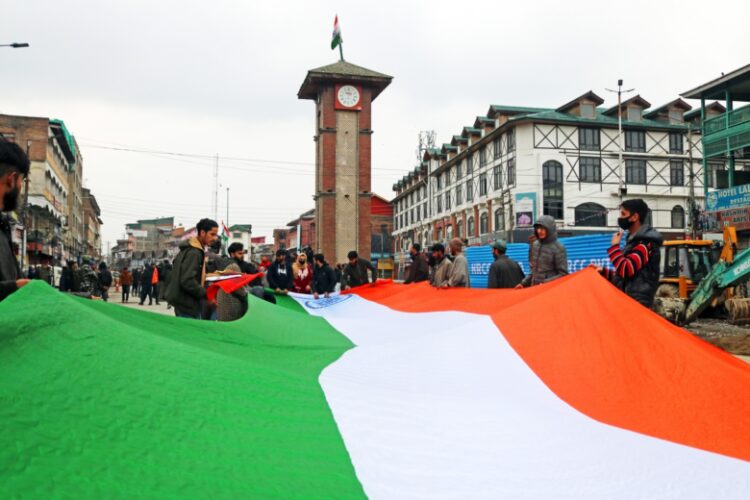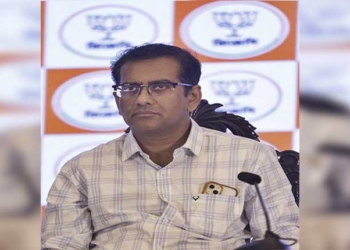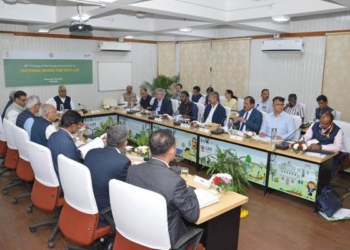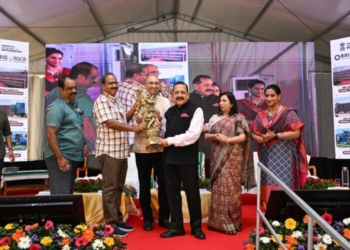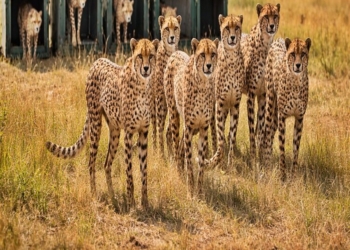Srinagar: Four years from the abrogation of Article 370, it is a new dawn in Jammu and Kashmir. The Union Territory has been all round development in the last four years. From economy to infrastructure development everything rose to a different level. Worth mentioning that people’s quality of life in the Union Territory have become much better.
Lieutenant Governor of the Union Territory Manoj Sinha had said that J&K’s economy has been “living up to the expectation after August 2019.”
“After August 2019, J&K’s economy has been living up to the expectation. In FY 2021-22 MSMEs export registered 54 per cent growth and importer-exporter registration has gone up by 173 per cent. Strategic focus on food processing, handicraft & organic products has stimulated the economic growth,” Sinha said in a tweet.
He said J&K has one of the fastest-growing horticulture markets in the country. “Our strengths in natural resources & skilled workforce, best in class incentives through new Industrial scheme are well known and makes J&K an ideal MSME destination.”
Sinha said new strength, resilience and global competitiveness of MSMEs will make India a preferred destination for manufacturing for the world.
In an official handout, the government said that over the last three years, “the pace of execution of developmental schemes has increased five times on account of resurgent institutional framework.”
“Similarly, grass root democratic institutions like panchayats and urban local bodies have been empowered to actively participate in the decision-making process to cater to the needs of common citizens,” it said.
“In the last two years, the government has endeavoured to develop areas which had remained neglected till now. Dalits, tribals and socio-economically backward classes have benefited from an equitable governance system, so have the women of the Union Territory of Jammu and Kashmir,” it added.
The Government said the Union Territory has “achieved new horizons of success in the field of business, economy, education, culture and sports.”
The aspirations of the youth of Jammu and Kashmir have been synchronized with the aspirations of the country today.
It added: “Their dreams are not confined to personal development, but transcend to create a good future for the society, nation and the entire humanity”. “The youth of Jammu and Kashmir today aspire for an equitable society free from poverty, unemployment and exploitation. They want a society which challenges and harnesses their creativity.”
In a milestone achievement, Jammu and Kashmir has received investments worth about Rs 2,200 crore and generated more than 10,000 jobs in one year under its New Industrial Policy (NIP) 2021.
The data says that from 2022 onwards, the J&K Industries department has allotted land to 1,854 units of which 854 have paid the premium.
Out of the total number of units allotted with land, 560 have already started paying their premium, reported a media outlet.
As per the data revealed by the New Industrial Policy officials, a total of 5,327 investment proposals have been received for J&K. The investment amount of all these proposals stands at Rs 66,000 crore. The last time when the region received such a massive investment was in 1947, reported a newspaper.
The NIP has a spending outlay of Rs 28,400 crore, the largest incentive to date, on the industrial development of Jammu and Kashmir for the next 15 years. The incentive is expected to generate an investment of Rs 20,000 crore and generate 4.5 lakhs of employment over the planned period.
The G-20 summit has served as an eye-opener for anyone that regards Jammu & Kashmir merely as a troubled region. The political and security lens through which J&K has been viewed has undergone a transformation as well, reported a local newspaper in Kashmir.
Since the abrogation of Article 370 in August 2019, the Union government has made significant efforts to foster a conducive environment for the growth of industries in Kashmir. Various initiatives have been undertaken. The J&K Global Investors’ Summit, where agreements worth Rs. 13,732 crores were signed. There has been a surge in private investments, reaching Rs. 38,000 crores.
The implementation of numerous projects covering infrastructure, healthcare, education, tourism, agriculture, and skill development. In March this year, the makers of Dubai’s iconic Burj Khalifa, initiated a ground breaking ceremony for a shopping mall and multipurpose tower in the outskirts of Srinagar, constituting the first Foreign Direct Investment in the UT.
Remarkable milestones continue to shape the region’s destiny, like on-going investment projects worth Rs. 10,000 crore and proposals worth Rs. 50,000 crores, which promise to drive economic growth.
The road transport and highways ministry, led by Nitin Gadkari, has undertaken developmental works worth Rs 1.3 lakh crore. Over the years, 500 kilometers of roads have been completed, with plans for a 110-kilometer Amarnath Marg to the holy cave shrine at a cost of Rs 5,300 crore.
Union Home Minister Amit Shah inaugurated or laid the foundation of 84 development projects of about Rs 586 crore recently.
Various development initiatives like ‘Jal Jeevan Mission’, ‘Har Ghar Nal Se Jal’ and many more developmental projects undertaken by the central government to shape the developmental profile of Jammu and Kashmir in a better direction.
Under ‘Khelo India’ and ‘Fit India’ initiatives, Union Minister Kiren Rijiju said, various activities have been organised across Jammu and Kashmir to inculcate moral values and promote sportsmanship among the students as well as the development of infrastructure.
Panchayat and block development council elections have witnessed remarkable participation, demonstrating the growing democratic fervor in the region. With the establishment of over 134,000 houses under the PM Awas Yojana (Gramin) and the approval of two AIIMS hospitals, one in Jammu and another in the Kashmir Valley, a new chapter of industrial development has been ushered in. This ambitious plan is projected to create 450,000 direct and indirect jobs, elevating the primary sector’s role in the region’s growth.
(IANS)




